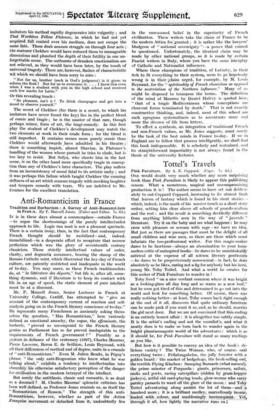The Secret of Chekhov
That Worthless Fellow Platonov. By Anton Chekhov. Trans. lated from the Russian by John Cournos. (Dent. 6s.)
IT would be unfair to apply the ordinary principles of criticism to a juvenile work which its author deliberately left unpub-
lished and even unfinished. Had it been an unknown writer's only excursion into literature, the manuscript of That Worth_ less Fellow Platonov would have mouldered unread or perished in a holocaust of family papers ; and the world would not--
let us be quite frank about it----have been much the poorer. The reason for its publication, and its claim on our notice, is that it represents the first essay in draniii of the author of The Cherry Orchard and Three Sisters ; and its interest is the light Which it throws on the foundations of his dramatic art.
Platonov, the only full-length character in the piece, is the familiar Chekhovian " hero " (the perfect irony of the de-
scription goes to the roots of Chekhov's art) who never means any harm or does any good. He is a sort of a first sketch for the hero of the later Ivanov, and a speech- of the latter (to the address of women in general and of his mistress in particular) might serve as a motto for this earlier piece :--- • "-As long- as a man is healthy, strong and lively, you pay no attention to him ; but as soon as ever he goes downhill and plays the aOWn-and-out, you begin to hang on his neck."
It is this qualification which makes Platonov irresistibly attractive to four different women, including his own wife. The pray deals with his resulting embarrassments,- and in the last scene he is shot through theheart by one of his mistresses. The extreme skill-and delicacY- of'-.Chekhov's technique are the salt which preserve his art from decay. In the hands of imitators his method rapidly degenerates into vulgarity ; and That Worthless Fellow Platonov, in which he had not yet acquired full control over his medium, does not escape the same fate. These drab amours straggle on through four acts ; the maturer Chekhov would have reduced them to manageable dimensions and plumbed the depth of their futility in one un- forgettable scene. The outbursts of drunken emotionalism are not relieved, as they would have been later, by the touch of universal• -tragedy. There are, however, flashes of characteristic wit which we should have been sorry to miss : " Not for us, brother (such is God's judgment) is it given to reform the flesh I Not for us to overcome it.. . . I knew this even when I was a student with you in the high school and received such low marks for Latin."
• Or this revealing touch : " So pleasant, isn't it ? To drink champagne and get into a mood to observe yourself."
The secret of Chekhov (for there is a secret, to which his imitators have never found the key) lies in the perfect blend , of comic 'and tragic ; he is the master of, that rare, though perhaps minor, form of art, the tragi-comedy. In this first play the student of Chekhov's development may watch the two elements at work in their crude form ; for the blend is still imperfect. It contains scenes more purely comic than Chekhov would afterwards have admitted in his theatre ; there is something impish, almost Shavian, in Platonov's handling of the women whose Pursuit he tries to elude, but is ' too la2y to resist. But Sofya, who -shoots him in the last scene, is on the other hand more specifically tragic in concep- .tion than any of Chekhov's later characters. The play suffers from an inconsistency of mood fatal to its artistic unity ; and it was perhaps this failure which taught Chekhov the cunning 'deftness of an art which seasons tragedy with mocking laughter 'and tempers comedy with tears. We- are indebted to Mr. Cournos for the excellent translation.



























































 Previous page
Previous page